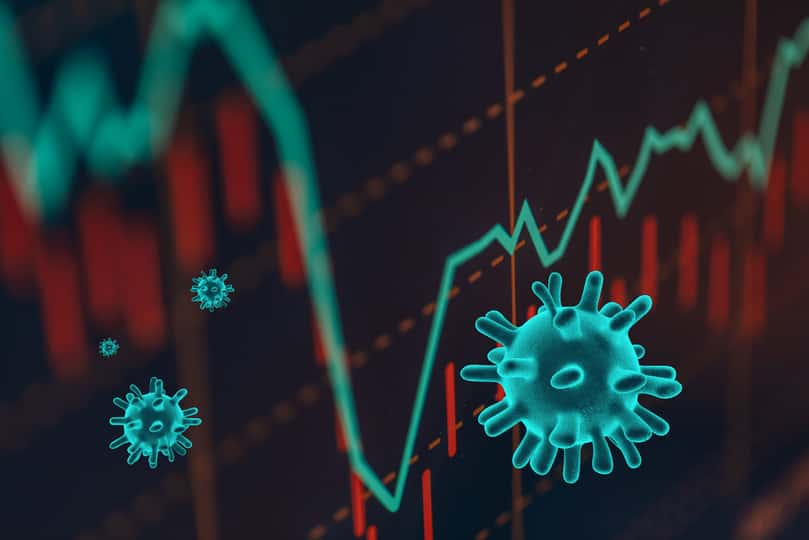Gilead Sciences, Inc. (GILD) is a research-based biopharmaceutical company that discovers, develops, and commercializes innovative medicines in areas of unmet medical needs. The company’s primary areas of focus include HIV/AIDS, liver disease, and serious cardiovascular and respiratory conditions with operations in more than 35 countries worldwide.
On October 22nd, the FDA approved the antiviral drug Veklury (remdesivir) developed by GILD for the treatment of patients with COVID-19 requiring hospitalization. As an antiviral drug, Veklury works to stop the replication of SARS-CoV-2, the virus that causes COVID-19. Veklury is now the first and only approved COVID-19 treatment in the United States despite not qualifying as a curative therapy and many doctors remain wary of using it widely.
GILD is slated to report third-quarter 2020 results on October 28th, after the market closes. The company has a disappointing financial track record. Net revenue in the second quarter ended June 2020, fell 5.7% year-over-year to $5.1 billion. Product sales were down 10% year-over-year. The company reported a loss of $2.66 per share for the quarter compared to EPS of $1.47 a year ago.
Hence, lack of investors’ optimism surrounding the effectiveness of the drug in reducing the risk of dying from COVID-19 and a potential downside based on several other factors have made our proprietary system rate GILD as a “Sell.”
Here is how our proprietary POWR Ratings system evaluates GILD:
Trade Grade: F
GILD is currently trading lower than its 50-day and 200-day moving averages of $64.17 and $71.08, respectively, indicating that the stock is in a downtrend. The stock’s 17% loss over the past three months reflects short-term bearishness.
The approval of Veklury marks an important milestone to help contain the pandemic by offering a treatment that could help patients recover faster from COVID-19. However, Veklury’s commercial shelf life is not expected to be long. According to Citigroup (C) analyst Mohit Bansal, revenues from remdesivir could fleet away after 2021, especially after competitor readouts with better antibody treatments and vaccines being developed eventually. He expects remdesivir sales to taper off in next year’s second half.
Moreover, Jim Cramer believes, “People are forever thinking that if we have a winner in this space it’s going to make a fortune. But for Gilead, this is going to be a drug that’s part of the mix. But it’s not going to be the thing that moves their stock.”
Furthermore, GILD has recently announced the completion of the previously announced transaction to acquire Immunomedics, Inc. (IMMU) for approximately $21 billion to accelerate its oncology pipeline. The deal is being perceived as expensive, limiting GILD’s ability to make other big acquisitions, and Bansal believes that the acquisition isn’t expected to contribute to the company’s top line in a meaningful way for at least the next two years.
Buy & Hold Grade: C
In terms of proximity to its 52-week high, which is a key factor that our Buy & Hold Grade takes into account, GILD is positioned unfavorably. The stock is currently trading 53.6% below its 52-week high of $274.03.
Looking at the past three years, the stock has lost 13.7% due to its weak financials and change in business behavior amid rising competition. GILD’s EBIT has declined at a CAGR of 37% during the same period.
GILD’s base business of antivirals against HIV and hepatitis is witnessing a setback. GILD has not been able to ramp up after its revolutionary HIV and hepatitis C drug saw price erosion. It is not a recurring drug and the number of patients has gone down substantially. Moreover, a rebuff from US regulators on developing anti-inflammatory drugs for arthritis treatment with its partner Galapagos (GLPG) was a huge disappointment for GILD.
Peer Grade: C
GILD is currently rated #113 out of 384 stocks in the Biotech industry. Other popular stocks in the group are Amgen Inc. (AMGN), Arena Pharmaceuticals, Inc. (ARNA), and Fate Therapeutics, Inc. (FATE).
GILD is down 5.1% year-to-date. While AMGN has lost 4.8%, ARNA and FATE have gained 88.4% and 139.7%, respectively, over this period.
Industry Rank: C
The StockNews.com Biotech industry is ranked #104 out of the 123 industries. Companies in the biotech space manufacture drugs, therapies, vaccines, and medical diagnostic tests for the treatment of health disorders and illnesses. The sector has received a lot of attention and hype lately thanks to the COVID-19 pandemic. The outbreak has highlighted the importance of science and technology in advancing the course of treating ailments. However, the industry is considered one of the riskiest for investors as drug development is a difficult, time-consuming, and expensive process.
Overall POWR Rating: D (Sell)
Overall, GILD is rated a “Sell” due to its declining business, lack of analyst confidence, rising competition, and weak price momentum, as determined by the four components of our overall POWR Rating.
Bottom Line
Before the formal approval, remdesivir was previously authorized by the FDA for emergency use to treat COVID-19 in May. The widespread use in coronavirus clinics showed that remdesivir wasn’t effective, and GILD’s share price has eventually shed its early-year gains. On October 16th, a major study by the WHO found that the drug had little to no effect on the mortality rate.
Furthermore, the sale of the drug is far lower so far and the company may not be able to meet its $3 billion sale target by 2020. The Department of Health and Human Services, which was responsible for distributing the drug, reported that hospitals only bought 32% of 500,000 available courses, worth about $500 million in the second quarter. In July, the European Union purchased 30,000 courses worth another $74 million. The EU contracted for 500,000 remdesivir courses over the next six months, but the dealer reserves the right to purchase. Hence, remdesivir may not be profitable for GILD.
In short, GILD is facing twin threats of low efficacy and weak sales. While the company is working on developing new products that could prove effective and receive approvals in different geographies, it’s hard to see how its stock could go anywhere but down in the meantime. GILD’s progress may well make it worth reevaluating the stock, but investors should stay away from it for now.
Want More Great Investing Ideas?
Top 11 Picks for Today’s Market
Dangerous Outlook for Stocks Into Election
5 WINNING Stocks Chart Patterns
GILD shares were trading at $59.55 per share on Tuesday afternoon, down $0.41 (-0.68%). Year-to-date, GILD has declined -5.70%, versus a 6.76% rise in the benchmark S&P 500 index during the same period.
About the Author: Sidharath Gupta

Sidharath’s passion for the markets and his love of words guided him to becoming a financial journalist. He began his career as an Equity Analyst, researching stocks and preparing in-depth research reports. Sidharath is currently pursuing the CFA program to deepen his knowledge of financial anlaysis and investment strategies. More...
More Resources for the Stocks in this Article
| Ticker | POWR Rating | Industry Rank | Rank in Industry |
| GILD | Get Rating | Get Rating | Get Rating |
| AMGN | Get Rating | Get Rating | Get Rating |
| ARNA | Get Rating | Get Rating | Get Rating |
| FATE | Get Rating | Get Rating | Get Rating |






